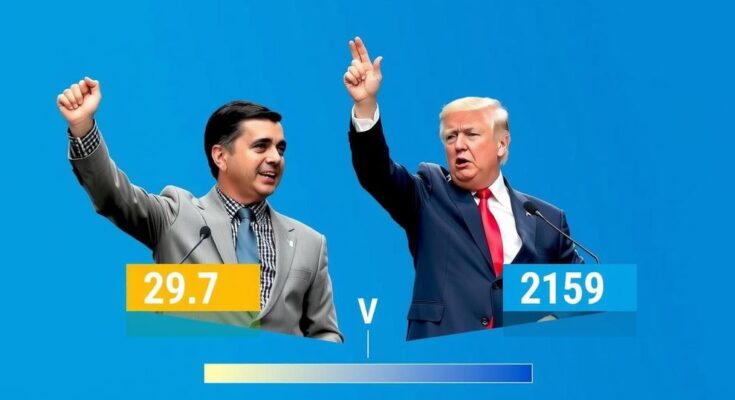Uruguayans participated in a closely contested presidential runoff election, with Álvaro Delgado of the National Party and Yamandú Orsi of the Broad Front vying for presidency. Neither candidate gained a majority in the first round, leading to the runoff amidst heightened public concern over crime and economic issues. Analysts note a unique sense of indecision among voters, reflecting a political atmosphere devoid of extreme populism, indicative of Uruguay’s democratic strength.
On Sunday, Uruguay embarked on the second round of its presidential election, marking a significant shift from a previously subdued political landscape to a highly competitive runoff. The election pits Álvaro Delgado from the governing conservative National Party against Yamandú Orsi of the left-leaning Broad Front. This race follows the October elections where neither candidate secured an outright majority, prompting this decisive showdown.
The Broad Front, which governed successfully for 15 years until 2019, seeks to regain its influence after having enacted substantial social reforms, including the legalization of abortion and same-sex marriage. In the initial voting, Orsi’s coalition garnered 44% of the vote, while Delgado’s party achieved only 27%. However, when accounting for the votes from other conservative parties, Delgado appears to hold a slight advantage. Recent polls show a virtual tie between the candidates, with nearly 10% of voters remaining undecided as Election Day approached.
Analysts highlight an unusual sense of ambivalence in this election, which contrasts sharply with populist sentiments seen globally. Voter indecision stems partly from the candidates’ similar stances on pivotal issues, leading to a campaign marked by muted enthusiasm. Nicolás Saldías, a senior analyst at the Economist Intelligence Unit, noted, “The question of whether Frente Amplio raises taxes is not an existential question, unlike what we saw in the U.S. with Trump and Kamala framing each other as threats to democracy.”
Both candidates are addressing heightened public concern over crime, with Delgado proposing rigid crime policies, including the construction of a new maximum-security prison, while Orsi emphasizes community-based preventative measures. Delgado, 55, serves as the continuity candidate, vying to maintain the current government’s legacy and campaign promises under the motto “re-elect a good government.”
Delgado’s campaign occurs amid a backdrop of general approval for the outgoing President Luis Lacalle Pou, whose tenure has been marked by economic growth and gradually declining inflation rates. Meanwhile, Orsi, 57, seeks to align his platform with the popular policies of former President José “Pepe” Mujica, advocating for a balanced approach towards both investment incentives and modest social reforms. Orsi aims to forge a “new left” in Uruguay without advocating for radical changes.
Despite a recent failed plebiscite regarding pension increases, which emphasized a preference for fiscal responsibility over generous payouts, the overall political climate in Uruguay continues to reflect a democratic stability. This election is seen as indicative of Uruguay’s democratic resilience, marked by a consensus-driven political landscape that stands in stark contrast to the divisive politics seen in other regions.
Uruguay’s political landscape has been characterized by a historical dominance of both conservative and leftist ideologies, particularly illustrated through the governance periods of the National Party and the Broad Front. Following years of leftist leadership, the conservative National Party re-assumed power in 2019. This historic contest not only serves as a referendum on past policies but also reflects ongoing societal issues such as crime and economic disparity, making the election particularly significant amidst a backdrop of evolving public expectations and international scrutiny of democracies.
In conclusion, the runoff election in Uruguay epitomizes a significant shift towards competitiveness in its political arena, as it presents two candidates with contrasting approaches to governance under a backdrop of democratic resilience and voter apprehension. While addressing crime and economic issues, both candidates’ appeal remains tempered by their moderate platforms. The outcome will not only shape future policies but also potentially redefine political dynamics in Uruguay for years to come.
Original Source: www.voanews.com




